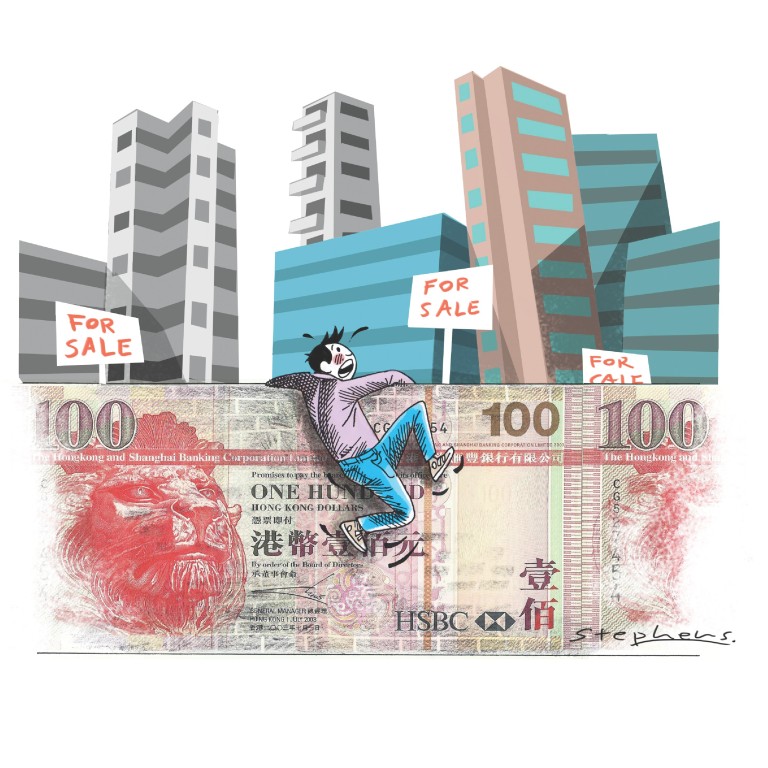
Why Hong Kong housing affordability has little to do with supply
Ian Brownlee says increasing the housing supply in Hong Kong won't necessarily lead to more people owning a home, as the policies and financing controls in place now effectively keep prices high
Hong Kong's housing has been unaffordable for many local people for around 30 years. It is ironic that when worldwide interest rates are low, it is almost impossible for middle-income people in Hong Kong to buy a flat.
Financial obstacles put in place by the government and the Monetary Authority protect the banking system and keep the property market high. They prevent people with a reasonable income and little accumulated wealth from buying a flat, trapping them in the unaffordable private rental market.
Recent history shows housing only became affordable with the exceptional impact of the Asian financial crisis in 1998 and the severe acute respiratory syndrome outbreak in 2003. Under the existing financial structure, affordable levels are only likely to occur if similar exceptional events occur, or if a major review is made of financing the housing market.
Studies indicate that affordability in Hong Kong's housing market is not determined by supply. They show that, over the past 20 years, there has been no correlation between the number of units provided and the price of housing. Price is consistently high regardless of supply.
The government's focus on increasing housing supply is unlikely to improve affordability, as other factors are more significant in determining prices and who can buy. A commitment to sustainable development requires us to change institutional mechanisms to find solutions, before we permanently damage our physical and social environment by rezoning sites for housing that are reserved for community facilities, open space and green belts.
The property market has other unusual characteristics. A high proportion (almost half) of all private housing is owned without a mortgage. This means there is sufficient wealth in the community to enable property to be purchased without bank financing. There is also almost no mortgage loan delinquency in Hong Kong, meaning borrowers meet their commitments. There is little risk for banks or the banking system.
Demand-side controls have no effect on reducing market prices, as property still remains affordable for those with sufficient accumulated wealth. This can be seen in the present market.
I discussed affordability with a group of young professionals who are directly affected. Public housing is not an option for them. Their main concern is that they are forced into sharing housing with other generations of their family, often to an extent of overcrowding, even as they marry and start their own family. Having insufficient funds to provide the cash portion of the purchase is the main obstacle.
The Monetary Authority's controls have the most impact on affordability for this group. The recently introduced controls of capping at 60 per cent the loan-to-value ratio for properties worth less than HK$7 million is exceptionally high in comparison with other places. This is the biggest obstacle to them buying. They cannot accumulate enough cash as they are paying high rents; they do not have sufficient income to meet the 60 per cent restriction.
Controls also limit what banks can lend on buildings that are more than 30 years old. This unnecessarily excludes old buildings from affordable financing. Banks should determine the risk and value of a mortgage in old buildings, rather than following a dictate related purely to age.
When housing prices dropped to affordable levels around the Sars outbreak, some owners were at risk of being in negative equity, with the mortgage higher than the reducing value of their property. Measures were introduced which effectively ensured that prices rose back to the mortgage levels. This means property levels will never be allowed to drop to affordable levels.
One reason for high housing costs is the land premium which the government charges for the development of new housing, usually between 50 and 60 per cent of the total cost of a flat. Others have proposed that the government could restructure this "community charge" on development, with higher rates on the property over the life of the government lease instead. This would remove the enormous upfront built-in cost on housing.
If the historical trends remain unchanged, it will probably be necessary to accept that the Hong Kong housing market is a high-cost commodity market, and that households will have to budget around 40-50 per cent of their income for housing. While this is affordable for many, it will not address the problems for those stuck in the "rental rut".
Increased supply is unlikely to solve affordability, but the following may help:
- Reduce the premium from land sales and charge higher rates over the length of the government lease;
- The government provides one-off cash grants and/or relaxes controls on lending for first-time purchasers;
- Allow a lower percentage of the cash portion of the sale price generally, so that lower-income groups can afford to buy;
- Provide a rent subsidy for low-income groups;
- Remove restrictions on old buildings;
- And, accept that for property to become affordable, prices must drop, and negative equity for some owners will be part of that process, allowing banks to adjust mortgages as flat values decrease.
There is a definite need to ensure an orderly supply of new housing in properly planned new development areas. But there is an even greater need to reduce the financial constraints on the private housing market that make it so unaffordable for so many.

